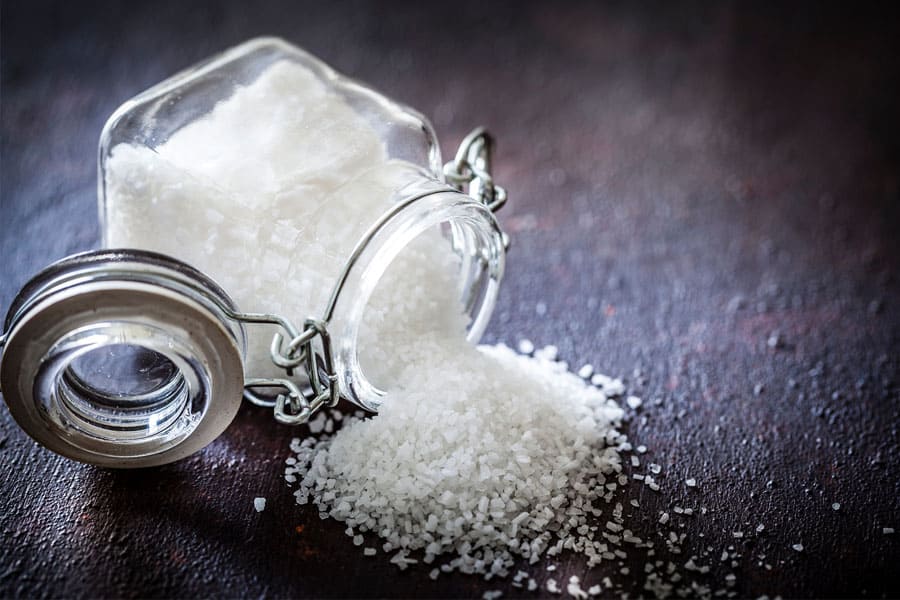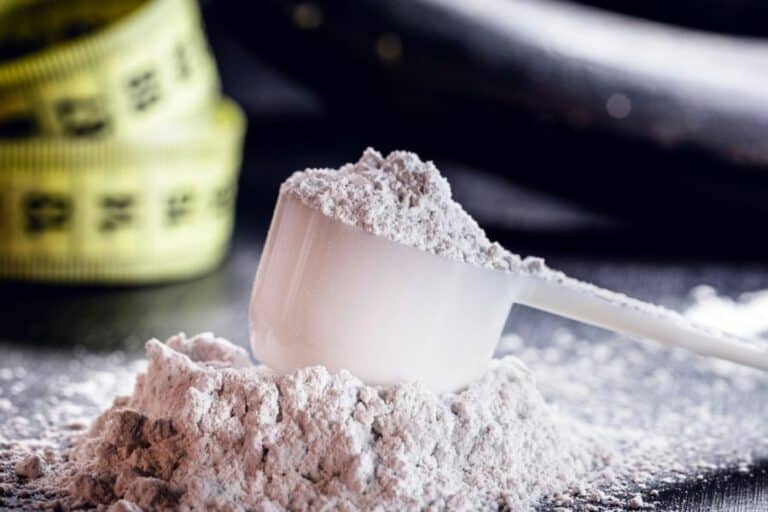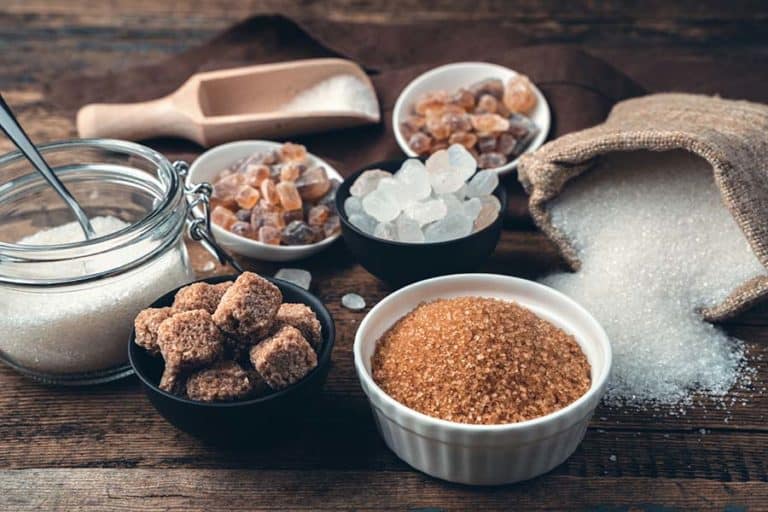Salt Pre-Workout: Benefits And How Much To Add

How Much To Consume? | Best Pre-Workout Salt | Why Consume Salt | Benefits | Side effects | who should avoid | FAQs
Gymgoers, bodybuilders, and athletes regularly lose salt during workouts in the form of sweat. Replenishing the lost salt is essential for maintaining the electrolyte balance in our body.
Consuming ½- 1 teaspoon of salt pre workout can replenish the salts and minerals lost during sweating. Additionally, salt as a pre-workout supplement helps with increased hydration, stronger muscle contractions, and better blood flow.
This article will discuss everything you need to know about salt as a pre-workout supplement, why you need to consume it, and the science behind how it helps.
How much salt should you consume before a workout?
It is important for people to have enough sodium in their diets. The National Library Of Medicine recommends low sodium [1]National Library of Medicine: Sodium Intake and Health: What Should We Recommend Based on the Current Evidence? intake (below 2.3 g/day, 5.8 g/day of salt) for entire populations.
However, athletes, gymgoers, and bodybuilders need to consume a little more than the recommended amount of salt. We have provided a list of salt recommendations to consume before workouts:
- Moderate climates – ½ teaspoon
- Hot climates – ½ to 1 teaspoon
- Very hot climates – 1 to 2 teaspoons
Sodium consumption should ideally be equal to the sodium concentration lost in sweat. This is why one needs to be very careful, as a higher concentration can lead to many health risks.
Which salt is ideal for pre-workout?
There are three types of salt available.
- Table salt
- Sea salt
- Himalayan pink salt
The similarities between these salts are significant to some degree. However, the origin and how these salts are being processed differ from one another.
Let us understand how they are processed and harvested. Also, if your preference will affect your workout sessions:
- Table salt: Table salt contains more iodine and has a larger sodium content. Also, this salt contains all the nutrients required for endurance and muscle gain. Therefore, the most suitable and ideal salt to use before a workout is table salt.
- Sea salt: The nutrients in sea salt can be found only in trace amounts. Also, it has a lower sodium and iodine composition. Therefore, sea salt is not the ideal salt to use before a workout.
- Himalayan salt: A research study [2]National Library of Medicine: An Analysis of the Mineral Composition of Pink Salt Available in Australia by the National Library Of Medicine (NCBI) shows that pink salt has a higher composition of some nutrients but lower levels of sodium and iodine. It also contains traces of heavy metals like lead which can cause anemia, weakness, and kidney and brain damage. Hence, Himalayan pink salt is not the ideal salt to use before a workout. Ideally, use a pre-workout like German Pharma PR3 The Ultimate Pre Workout [3]Prohormones: PR3 The Ultimate Pre Workout which includes Himalayan Salt in safe proportions.
The science behind consuming salt as a pre-workout supplement
Salt is consumed as a pre-workout because it provides energy for working out, and it is a lot more useful for strength training and performance.
Many strength coaches and nutritionists state that salt is one of the most effective and efficient performance-enhancing minerals.
- Our body loses salt during workouts in the form of sweat, causing dehydration and poor performance. Consuming salt prior to a workout will help in retaining the lost salt in the body. Also, it will hydrate the body for enhanced endurance and better muscle growth.
- Research shows that consuming salt before a workout increases [4]PubMed: Acute Sodium Ingestion Before Exercise Increases Voluntary Water Consumption Resulting In Preexercise Hyperhydration and Improvement in Exercise Performance in the Heat and boosts your energy levels, improves blood flow, regulates muscle contraction, and allows you to work out longer.
- Consuming salt also improves cardiovascular function. It provides better blood circulation, which is crucial for people who are suffering from heart attacks and other heart diseases. Most importantly, salt or sodium helps in maintaining normal blood pressure.
However, we must also keep in mind that excess salt or sodium intake can harm you and lead to heart diseases [5]Centers for Disease Control and Prevention: Sodium and Health like high blood pressure.
Benefits of salt before workout
There are several health benefits to consuming salt/sodium before your workout routine. Besides supplying energy for working out, it pumps up your blood circulation and saves you from many heart diseases.
Let’s take a closer look at the benefits of consuming salt before a workout.
1. Body hydration
Sodium, an electrolyte, helps replenish body hydration lost during a sweaty workout. It maintains fluid balance during workouts as it promotes intracellular fluid retention.
2. Enhanced workout performance
When you eat more salt to give your body more energy, your salt-retaining hormones decrease, making your fat cells more responsive to insulin. Your insulin levels may drop when you cease restricting salt, allowing your body to access its fat stores for energy.
3. Muscle gain and pump
Our energy levels increase, our endurance improves, and our cardiovascular blood flow reaches new heights when we boost our salt consumption to a healthy level.
These factors contribute to workouts that are more effective, more powerful, and less taxing. One of the greatest advantages is optimal muscle performance, which enables you to accomplish your fitness goals faster.
4. Prevention of muscle cramps
Sodium or salt is an excellent mineral to prevent heat cramping [6]PubMed: The role of sodium in ‘heat cramping’ in bodybuilders, gym goers, and athletes.
Heat cramping induces muscle pain caused by “salty sweating.” Consuming enough sodium or salt prior to your workout will help with heat cramping.
It also helps in maintaining the delicate balance necessary for optimal muscle and nerve activity.
5. Lower chance of hyponatremia
Hyponatremia is a common electrolyte disorder that occurs when the water content in the body exceeds the amount of sodium in the body.
Ingesting salt as a supplement can help your body to prevent hyponatremia and improve water excretion.
6. Proper blood flow
A vigorous workout routine can decrease blood volume within three minutes. Adding more salt to your diet before working out can increase blood volume, which in turn, can lead to better blood flow.
Are there any side effects of too much salt intake in pre-workout?
Consuming salt in greater quantities than recommended can affect performance in workouts and can result in some severe cardiovascular system problems.
Here are a few common side effects of higher salt consumption:
- Bloating
- High blood pressure
- Swollen feet or hands
- Increased thirst
- Water retention or weight gain
- Restlessness at night
- Weakness
- Headache
- Nausea and vomiting
- Dehydration
According to research, a high intake of sodium in the long-term has more severe side effects such as stomach cancer [7]PubMed: Dietary salt intake and risk of gastric cancer, renal calcium loss [8]PubMed: Salt intake, hypertension, and osteoporosis, stones, osteoporosis, and bone loss. Sodium intake in higher quantities also has an inverse effect on hydration [9]National Library of Medicine: Young Adults with Higher Salt Intake Have Inferior Hydration Status: A Cross-Sectional Study.
Some of the long-term effects of higher salt consumption are:
- Stroke
- Kidney disease
- Enlarged heart
- Heart attack
- Seizures
- Hypernatremia
An ideal solution to prevent higher salt/sodium intake and its negative health effects is to monitor your intake daily.
Who should not add salt to pre-workout?
If your workout routine is not intense and is normally short, you should not add salt to your pre-workout. Salt works well for those who train hard and sweat for longer during workouts.
Here is a list of health reasons why you should not salt your pre-workout:
- Water weight retention,
- High blood pressure
- Heart failure
- Liver or kidney disease
If you have been suffering from all of the above-mentioned health issues, it is best to avoid salt as a pre-workout.
What should I eat before a workout to maximize the benefits of salt?
Consuming a pre-workout meal that contains carbohydrates and protein can help maximize the benefits of salt. This can include foods like a banana with nut butter or a smoothie with protein powder and fruit.
How does salt affect intracellular water retention during a workout?
Salt can help increase intracellular water retention during a workout by increasing blood volume, which in turn increases the delivery of nutrients and oxygen to the muscles. This can help improve performance and decrease the risk of dehydration.
Can you have too much sodium before a workout?
Yes, having too much sodium before a workout can lead to dehydration, especially if you are not properly hydrated. It’s important to consume salt in moderation and consult with a healthcare professional to determine your individual needs.
How does salt affect blood vessels during a workout?
Salt can help dilate blood vessels during a workout, leading to improved blood flow and nutrient delivery to the muscles. This can help improve performance and aid in recovery. However, it’s important to consume salt in moderation to avoid any negative effects on blood pressure or overall health.
Wrapping Up
Many people wonder whether consuming more salt as a supplement or food is good for their health or poses a risk. Keep all the points we have covered above in mind before consuming salt before every workout for an energizing session.
If you haven’t been keeping track of your intake or incorporated salt in your diet, start doing it right away.
FAQs
When is the right time to consume salt before a workout?
You can consume salt 15-20 minutes or 2 hours before training.
Does salt help with weight loss?
No, salt does not help with weight loss. However, excessive salt intake can contribute to water retention, which can make you feel swollen and cause an increase in body weight.
Is sodium good for muscle recovery?
Yes, sodium or salt is good for muscle recovery. During intense physical activity, your body loses sodium through sweat, which can lead to an electrolyte imbalance. Consuming sodium after exercise can help to replenish these lost electrolytes and support muscle recovery.
Does salt give you a pump?
Consuming salt before a workout can help increase blood volume, leading to a temporary increase in muscle size, also known as a pump. However, the effect is relatively short-lived and not necessarily significant in terms of long-term muscle growth.
How much salt to take before workout?
The amount of salt to take before a workout depends on individual factors such as body weight, activity level, and sweat rate. As a general guideline, consuming about 1 gram of salt 30 minutes to an hour before a workout may be beneficial. It’s essential to consult with a healthcare professional before making any significant changes to your diet.
References
| ↑1 | National Library of Medicine: Sodium Intake and Health: What Should We Recommend Based on the Current Evidence? |
|---|---|
| ↑2 | National Library of Medicine: An Analysis of the Mineral Composition of Pink Salt Available in Australia |
| ↑3 | Prohormones: PR3 The Ultimate Pre Workout |
| ↑4 | PubMed: Acute Sodium Ingestion Before Exercise Increases Voluntary Water Consumption Resulting In Preexercise Hyperhydration and Improvement in Exercise Performance in the Heat |
| ↑5 | Centers for Disease Control and Prevention: Sodium and Health |
| ↑6 | PubMed: The role of sodium in ‘heat cramping’ |
| ↑7 | PubMed: Dietary salt intake and risk of gastric cancer |
| ↑8 | PubMed: Salt intake, hypertension, and osteoporosis |
| ↑9 | National Library of Medicine: Young Adults with Higher Salt Intake Have Inferior Hydration Status: A Cross-Sectional Study |







